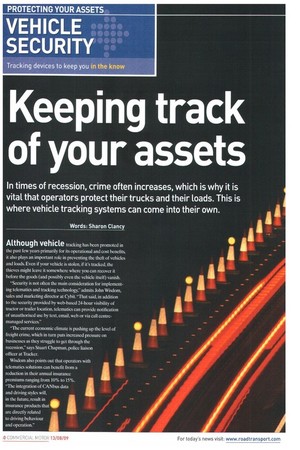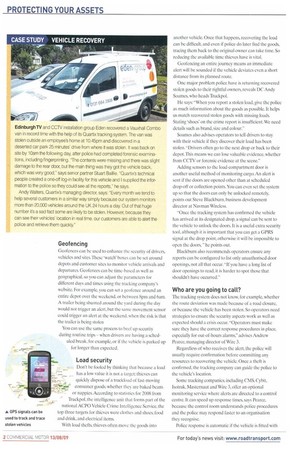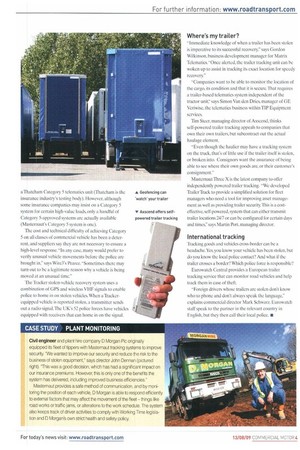Keeping track of your assets
Page 40

Page 42

Page 43

If you've noticed an error in this article please click here to report it so we can fix it.
In times of recession, crime often increases, which is why it is vital that operators protect their trucks and their loads. This is where vehicle tracking systems can come into their own.
Words: Sharon Clancy Although vehicle tracking has been promoted in the past few years primarily for its operational and cost benefits, it also plays an important role in preventing the theft of vehicles and loads. Even if your vehicle is stolen, if it's tracked, the thieves might leave it somewhere where you can recover it before the goods (and possibly even the vehicle itself) vanish.
"Security is not often the main consideration for implementing telematics and tracking technology,admits John Wisdom, sates and marketing director at Cybit. "That said, in addition to the security provided by web-based 24-hour visibility of tractor or trailer location, telematics can provide notification of unauthorised use by text, email, web or via call centremanaged services."
"The current economic climate is pushing up the level of freight crime, which in turn puts increased pressure on businesses as they struggle to get through the recession," says Stuart Chapman, police liaison officer at Tracker.
Wisdom also points out that operators with telematics solutions can benefit from a reduction in their annual insurance premiums ranging from 10% to 15%. "The integration of CANbus data and driving styles will, in the future, result in insurance products that are directly related to driving behaviour and operation."
Geofencing
Geofences can be used to enhance the security of drivers, vehicles and sites. "These 'watch' boxes can be set around depots and customer sites to monitor vehicle arrivals and departures. Geofences can be time-based as well as geographical, so you can adjust the parameters for different days and times using the tracking company's website. For example, you can set a geofence around an entire depot over the weekend, or between 8pm and 6am. A trailer being shunted around the yard during the day would not trigger an alert, but the same movement sensor could trigger an alert at the weekend, when the risk is that the trailer is being stolen You can use the same process to beef up security during routine trips when drivers are having a scheduled break, for example, or if the vehicle is parked up for longer than expected.
Load security
Don't be fooled by thinking that because a load has a low value it is not a target: thieves can quickly dispose of a truckload of fast-moving consumer goods, whether they are baked beans
7 or nappies. According to statistics for 2008 from Truckpol, the intelligence unit that forms part of the national ACP() Vehicle Crime Intelligence Service, the top three targets for thieves were clothes and shoes. food and drink, and electrical items.
With load thefts, thieves often move the goods into another vehicle. Once that happens, recovering the load can be difficult, and even if police do later find the goods, tracing them back to the original owner can take time. So reducing the available time thieves have is vital.
Geofencing an entire journey means an immediate alert will be sounded if the vehicle deviates even a short distance from its planned route.
One major problem police have is returning recovered stolen goods to their rightful owners, reveals DC Andy Soames, who heads Truckpol.
He says: "When you report a stolen load, give the police as much information about the goods as possible. It helps us match recovered stolen goods with missing loads. Stating 'shoes' on the crime report is insufficient. We need details such as brand, size and colour."
Soames also advises operators to tell drivers to stay with their vehicle if they discover their load has been stolen. "Drivers often go to the next drop or back to their depot. This means we can lose valuable evidence, whether from CCTV or forensic evidence at the scene.
Adding sensors to the load-compartment door is another useful method of monitoring cargo. An alert is sent if the doors are opened other than at scheduled drop-off or collection points. You can even set the system up so that the doors can only be unlocked remotely, points out Steve Blackburn, business development director at Navman Wireless.
"Once the tracking system has confirmed the vehicle has arrived at its designated drop, a signal can be sent to the vehicle to unlock the doors. It is a useful extra security tool, although it is important that you can get a GPRS signal at the drop point, otherwise it will he impossible to open the doors, "he points out.
Blackburn also recommends operators ensure any reports can be configured to list only unauthorised door openings, not all that occur. "If you have a long list of door openings to read, it is harder to spot those that shouldn't have occurred."
Who are you going to call?
The tracking system does not know, for example, whether the route deviation was made because of a road closure, or because the vehicle has been stolen. So operators need strategies to ensure the security aspects work as well as expected should a crisis occur. "Operators must make sure they have the correct response procedures in place, especially for out-of-hours alarms," advises Andrew Pearce, managing director of Wire 3.
Regardless of who receives the alert, the police will usually require confirmation before committing any resources to recovering the vehicle. Once a theft is confirmed, the tracking company can guide the police to the vehicle's location.
Some tracking companies, including CMS, Cybit, lsotrak, Masternaut and Wire 3, offer an optional monitoring service where alerts are directed to a control centre. It can speed up response times, says Pearce, because the control room understands police procedures and the police may respond faster to an organisation they recognise.
Police response is automatic if the vehicle is fitted with
-a Thatcham Category 5 telematics unit (Thatcham is the insurance industry's testing body). However, although some insurance companies may insist on a Category 5 system for certain high-value loads, only a handful of Category 5-approved systems are actually available (Masternaut's Category 5 system is one).
The cost and technical difficulty of achieving Category 5 on all classes of commercial vehicle has been a deterrent, and suppliers say they are not necessary to ensure a high-level response. "In any case, many would prefer to verify unusual vehicle movements before the police are brought in," says Wire3's Pearce. "Sometimes there may turn out to be a legitimate reason why a vehicle is being moved at an unusual time."
The Tracker stolen-vehicle recovery system uses a combination of GPS and wireless VHF signals to enable police to home in on stolen vehicles. When a Trackerequipped vehicle is reported stolen, a transmitter sends out a radio signal. The UK's 52 police forces have vehicles equipped with receivers that can home in on the signal.
Where's my trailer?
"Immediate knowledge of when a trailer has been stolen is imperative to its successful recovery," says Gordon Wilkinson, business development manager for Matrix Telematics. "Once alerted, the trailer tracking unit can be woken up to assist in tracking its exact location for speedy recovery."
"Companies want to be able to monitor the location of the cargo, its condition and that it is secure.That requires a trailer-based telematics system independent of the tractor unit," says Simon Van den Dries, manager of GE Veriwise, the telematics business within TIP Equipment services.
Tim Steer, managing director of Axscend, thinks self-powered trailer tracking appeals to companies that own their own trailers, but subcontract out the actual haulage element.
"Even though the haulier may have a tracking system on the truck, that's of little use if the trailer itself is stolen, or broken into. Consignors want the assurance of being able to see where their own goods are, or their customer's consignment."
Masternaut Three Xis the latest company to offer independently powered trailer tracking. -We developed Trailer Track to provide a simplified solution for fleet managers who need a tool for improving asset management as well as providing trailer security. This is a costeffective, self-powered, system that can either transmit trailer locations 24/7 or can be configured for certain days and times," says Martin Port. managing director,
international tracking
Tracking goods and vehicles cross-border can be a headache. Yes, you know your vehicle has been stolen, but do you know the local police contact? And what if the trailer crosses a border? Which police force is responsible?
Eurowatch Central provides a European trailer tracking service that can monitor road vehicles and help track them in case of theft.
-Foreign drivers whose trailers are stolen don't know who to phone and don't always speak the language," explains commercial director Mark Schwarz. Eurowatch staff speak to the partner in the relevant country in English, hut they then call their local police. •












































































































































